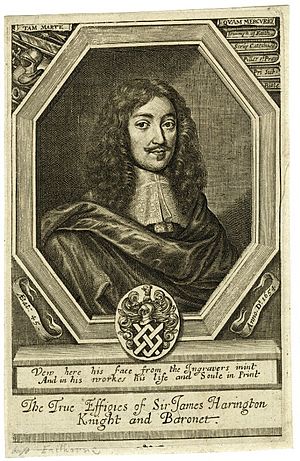Sir James Harington, 3rd Baronet facts for kids
Sir James Harington (born December 30, 1607, died around 1680) was an important English leader. He was a military officer and a politician. Sir James fought for the Parliament's side, known as the Roundheads. This was during a big conflict called the Wars of the Three Kingdoms.
Contents
Sir James Harington's Early Life
James Harington was the oldest son of Edward Harington and Margaret Doyley. He married Katherine Wright, who lived from 1617 to 1675. Katherine's father was Sir Edmund Wright. Sir Edmund was a very important person, serving as the Lord Mayor of London. James Harington later received Swakeleys House from his father-in-law.
Military Career and Battles
In 1642, James Harington became a Colonel. He led a group called the Westminster Trained Bands, also known as the Red Regiment. These were like local citizen soldiers.
Later, he commanded a large group of soldiers from London. This group included his own regiment and others. They fought in important battles. These included the Siege of Basing House and the Battle of Alton in late 1643. They were part of Sir William Waller's Parliamentarian army.
As a Major-General, Harington led another group of soldiers. These were from areas outside the main city. They joined Waller's campaign in 1644. This campaign ended with the Battle of Cropredy Bridge on June 29, 1644.
In the autumn of 1644, London sent a new group of five regiments. Harington led this group. They fought in the Second Battle of Newbury. During this battle, Harington's horse was shot from under him.
Political Life and Public Service
James Harington became a Member of Parliament (MP). He represented Rutland from 1646 to 1653. Then he represented Middlesex from 1654 to 1655.
He was one of the judges during the trial of King Charles I. While he was a judge, he did not sign the paper that led to the King's death.
After the King's rule ended, Harington continued to serve Parliament. This time was known as the Interregnum. He was part of the first Council of State. This council helped to govern England. For a time, he was even the president of this council.
After the King's family returned to power, Harington faced problems. He was not included in the Indemnity and Oblivion Act. This act pardoned most people who had fought against the King. Because of this, he had to leave England. He died in another country around 1680. His special title, Baronet, was taken away from him in 1661. He had inherited this title when his father died in 1653.
See also
- Portrait of Katherine Wright, Lady Harington, engraved by William Faithorne, Fitzwilliam Museum
- Baronet Ridlington
- James Harrington, a writer who was a cousin and is sometimes confused with Sir James.
 | Leon Lynch |
 | Milton P. Webster |
 | Ferdinand Smith |


